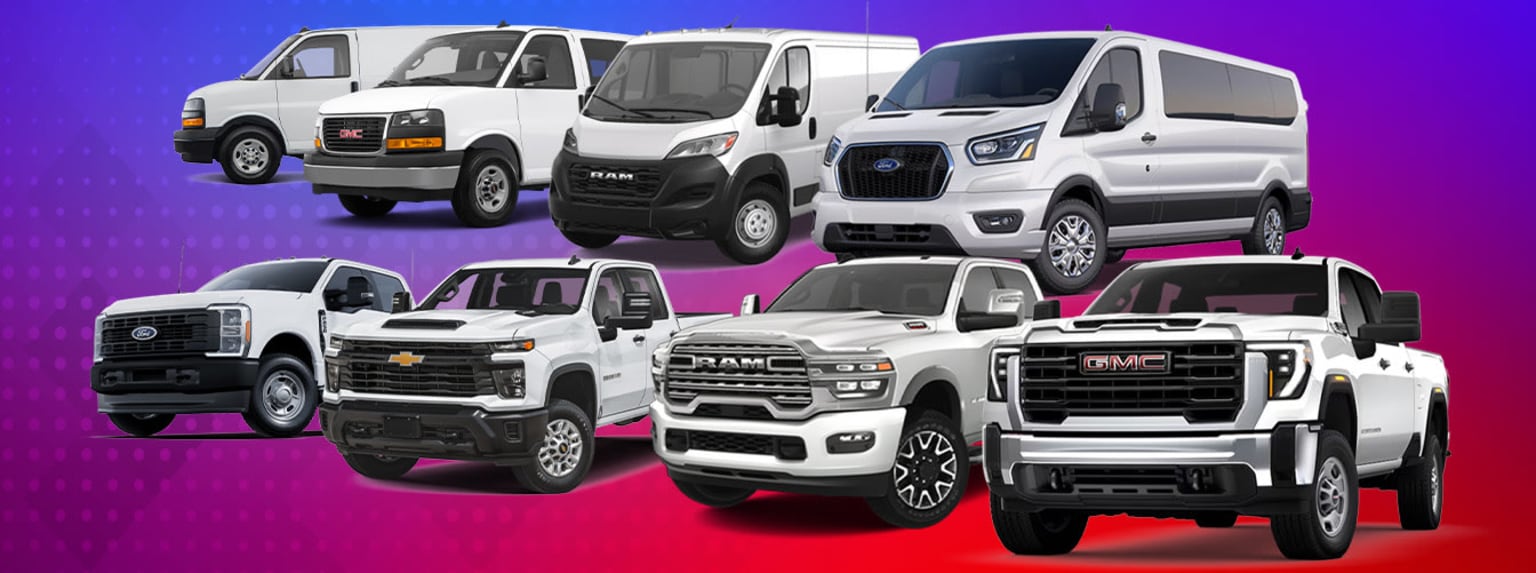
Commercial Vehicles That Qualify For Section 179
Saving More For Your Business with Section 179
One of the most valuable tax incentives available to businesses today is the Section 179 deduction. This deduction allows for substantial tax savings when you purchase and play certain business equipment into service during the tax year, particularly eligible vehicles. At Aschenbach Automotive Group, we understand that business owners across the country are constantly seeking opportunities to enhance their operations, minimize expenses, and invest in impactful assets. The following guide is written to help you understand the basics of the Section 179 deduction, especially how it applies to various Ford, Ram, Chevy, and GMC Section 179 vehicles that qualify and how to take advantage of the significant tax break. Visit us today at any of our locations across Pennsylvania, Maryland, and Virginia!

Understanding The Section 179 Deduction and Its Benefits
Before diving into specific models and guidelines, it’s important to grasp what Section 179 is all about. Section 179 of the U.S. tax code is a provision that lets businesses deduct the full purchase price of qualifying equipment, such as Section 179 vehicles, and the year the equipment is purchased and placed into service. By allowing businesses to deduct the full purchase price of qualifying equipment, Section 179 can significantly reduce taxable income and, consequently, the overall tax liability. Ordinarily, businesses would have to depreciate these assets over a number of years. However, Section 179 was created to incentivize businesses to reinvest in themselves, so the government allows you to accelerate your deduction in the first year up to certain limits.
Improved Cash Flow
Being able to write off the full purchase price of a Section 179 deduction vehicle in the current tax year can lead to a larger tax refund or a significant tax benefit, reducing the overall amount of taxes owed.
Easier Upgrades
A significant benefit of a Section 179 vehicle is the opportunity to purchase new, upgraded vehicles to keep your fleet current and efficient.
Strategic vehicle purchases under Section 179 can help keep your fleet current and efficient while maximizing tax savings.
Better Budgeting and Tax Savings
Instead of dealing with long-term depreciation schedules, small business owners can focus on making strategic decisions for the company and reinvesting tax savings in other business areas.
The Importance of Gross Vehicle Weight Rating and Section 179
The weight classification of a vehicle is crucial in determining whether it’s one of the vehicles that qualify for Section 179. By meeting the weight classification, businesses can take full advantage of the tax benefit provided by Section 179, thereby reducing their tax liability. In particular, Section 179 vehicles over 6,000 lbs. of gross vehicle weight rating, or GVWR, but under 14,000 lbs., often qualify for the maximum deduction because of their designation as heavy vehicles used in business operations. These heavy vehicles can fall under the category of the heavy vehicle tax deduction if they meet specific requirements.
Some cars qualify for Section 179 if they meet the requirements. Cars and other light vehicles are expected to be under 6,000 lbs. GVWR in order to qualify. The vehicle must be used primarily for business purposes, with a minimum of 50% business use.
Under current IRS guidelines, commercial trucks and large SUVs used for business purposes may be eligible for an accelerated depreciation deduction if they meet the weight threshold. This means that if you’re looking at a Section 179 vehicle for your company, a heavier pickup truck, cargo van, or large SUV might allow you to take advantage of a substantial tax break, often in the first year of ownership.
The key to maximizing your deduction is ensuring the vehicle is used at least 50% of the time for business purposes, verifying it meets the necessary weight classification, and confirming all appropriate paperwork is filed correctly.
Ford, Ram, Chevy, and GMC Models
Known for its best-selling F-Series trucks and highly versatile Transit vans, Ford stands out for reliability, towing strength, and cost-effective operation. Vehicles such as the Ford F-150, Ford F-250, Ford F-350, and Ford Transit all exceed the 6,000 lb. threshold minimum, making them prime candidates as Section 179 vehicles. These vehicle purchases can help businesses maximize their Section 179 deductions and improve operational efficiency. Ram’s lineup also qualifies, with the Ram 1500 in some configurations, Ram 2500, Ram 3500, and Ram ProMaster all meeting the 6,000 lb. GVWR requirement.
Chevrolet’s truck lineup has also enjoyed a long-standing reputation among contractors, farmers, and fleet operators. The Chevy Silverado series, including the Chevy Silverado 1500, Chevy Silverado 2500, and Chevy Silverado 3500, offer a variety of trim levels and packages that position it as a Section 179 vehicle option. Additionally, the Chevy Express Cargo Van remains a staple for tradespeople and qualifies for the heavy vehicle tax deduction.
GMC trucks and vans share many mechanical similarities with their Chevy counterparts but often add premium touches and unique styling. The GMC Sierra 1500, GMC Sierra 2500, and GMC Sierra 3500 are all trucks that qualify for Section 179. Meanwhile, the GMC Savana cargo van, which has proven durability for various commercial applications, also meets the criteria.
Consult A Tax Professional
While we at Aschenbach Automotive Group stay informed about the general rules and regulations surrounding Section 179 vehicles, our responsibility is to help get you in the right vehicle for your business. As tax laws often change and every business has unique financial considerations, it’s wise to sit down with a certified public accountant or tax attorney to discuss your specific situation. They can confirm which models qualify, guide you on how much of the purchase price you can deduct, and help you avoid any pitfalls that arise if your usage patterns or weight classifications don’t align with IRS guidelines. A tax professional can help you understand how Section 179 deductions will affect your taxable income and overall tax strategy.

Upgrade Your Fleet Today
Understanding Section 179 vehicles and how the deduction can enhance your business as a business owner is a crucial step toward strategically investing in your fleet. By selecting a Section 179 deduction vehicle that meets the IRS’s weight and usage requirements, you can boost your cash flow with support for your business’s growth in a competitive market. Aschenbach Automotive Group invites you to visit our dealerships across Pennsylvania, Maryland, and Virginia to explore our selection alongside the professionals on our commercial sales team to find the right model to transform your business. Visit us today!